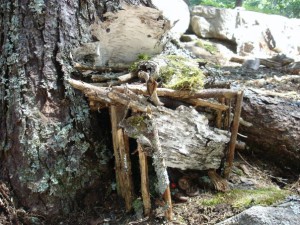A hundred thousand welcomes! That’s the translation from the Gaelic of the title of today’s chapter, a traditional Irish toast, quite proper for today, St. Patrick’s Day. There will be a lot of toasting today, to be sure. St. Patrick is sacred to Ireland, and as they say, everyone is at least a little Irish on St. Patrick’s Day. In this house, we’ll be eating the traditional corned beef and cabbage and soda bread, though oysters or shepherd’s pie or bangers and mash would be just as traditional. Take your pick. The day is widely celebrated with the wearing of the green and plenty of iconic imagery: shamrocks, harps, and shillelaghs, leprechauns and pots o’gold.
Patrick was a fourth century saint. He was born in Britain but was captured as a young man and taken to Ireland as a slave. He eventually escaped, made his way by sea to Gaul and became a priest there. He was made a bishop and soon after began to have visions suggesting he return to Ireland to spread the faith, which he did. One story tells of how he explained the Holy Trinity to the people of Ireland through the three leaves of the shamrock. He is most famous, however, for driving the snakes from Ireland. Whether it be by the hand of Patrick or not, there are to this day no snakes in Ireland, at least not in the wild. Some, however, think the story of Patrick driving the snakes from Ireland is more a metaphor for his driving the old Celtic gods and goddesses from the island, replacing the Old Ways with Christian beliefs.
But Ireland is a place of mystery, and if the story of St. Patrick and the snakes is indeed about the Old Ways and not about snakes, then it’s not true that they’re completely driven away, for there are plenty of these old mysteries still at play there, and some of the most fascinating stories, I think, revolve around the fairy folk: the stuff of legend, and yet there are those who firmly believe in the stories and their power. And St. Patrick’s Day, in particular, is a day that is best celebrated with stories and poems and songs of this place. So make your traditional Irish dinner, and pour some Jameson’s or some Guinness or Harp. But be sure, too, there is fiddle music, and something to read or recite.
Here in town tonight, over at St. Bernard’s, in the rectory after his meal, Father Seamus will certainly be pouring a glass of something and reciting Yeats. He is a man who loves to recite poetry to the congregation, and William Butler Yeats, the great poet of his long-ago homeland, is one of his favorites. Tonight, it could be any of his poems of Ireland. Seamus knows so many of them by heart, and perhaps tonight it will be this one:
Where dips the rocky highland
Of Sleuth Wood in the lake,
There lies a leafy island
Where flapping herons wake
The drowsy water rats;
There we’ve hid our faery vats,
Full of berrys
And of reddest stolen cherries.
Come away, O human child!
To the waters and the wild
With a faery, hand in hand,
For the world’s more full of weeping than you can understand.
Where the wave of moonlight glosses
The dim gray sands with light,
Far off by furthest Rosses
We foot it all the night,
Weaving olden dances
Mingling hands and mingling glances
Till the moon has taken flight;
To and fro we leap
And chase the frothy bubbles,
While the world is full of troubles
And anxious in its sleep.
Come away, O human child!
To the waters and the wild
With a faery, hand in hand,
For the world’s more full of weeping than you can understand.
Where the wandering water gushes
From the hills above Glen-Car,
In pools among the rushes
That scarce could bathe a star,
We seek for slumbering trout
And whispering in their ears
Give them unquiet dreams;
Leaning softly out
From ferns that drop their tears
Over the young streams.
Come away, O human child!
To the waters and the wild
With a faery, hand in hand,
For the world’s more full of weeping than you can understand.
Away with us he’s going,
The solemn-eyed:
He’ll hear no more the lowing
Of the calves on the warm hillside
Or the kettle on the hob
Sing peace into his breast,
Or see the brown mice bob
Round and round the oatmeal chest.
For he comes, the human child,
To the waters and the wild
With a faery, hand in hand,
For the world’s more full of weeping than he can understand.
The poem is “The Stolen Child.” Father Seamus loves it because it reminds him so intensely of the home he left behind when he crossed the western ocean and came to America. And as much as he loves it here, Ireland is always in his heart, and the world, he knows, is indeed full of weeping. St. Patrick’s Day is bittersweet for Seamus. Fairy folk are fewer and farther between here, and sometimes he feels a bit himself like a stolen child, removed from his homeland. But tonight, Seamus gets to celebrate that place. We all do, because we’re all Irish on St. Patrick’s Day. Céad míle fáilte!
This chapter of the Convivio Book of Days is a re-worked version of one published originally for St. Patrick’s Day, 2014. The image then and the image today is of a fairy house I stumbled upon at the base of a tree in a woods in Maine some years ago. Certainly some fairy folk exist there, too. Good to know.

Thanks for sharing as always, John.
Thanks for reading!